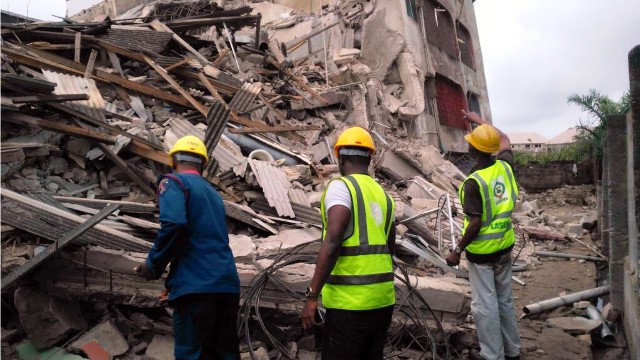Editorial
One Building Collapse Too Many

The death of nine persons with 31 others injured when a seven-storey-building collapsed along Woji Road in the GRA Phase 2 axis of Port Harcourt on Friday, November 23, 2018, has once again called attention to the level of abnormality going on in Nigeria.
According to reports, the building which was under construction, collapsed after an additional floor was added to it. The government has sympathised with those who lost their loved ones. The Governor of Rivers State, Chief Nyesom Wike, who visited the site also ordered the arrest of the owner and all those involved in the construction of the ill-fated building.
Experts have said that some factors responsible for such occurrences include dominance of quacks in the construction industry, design error, poor construction supervision, conversion of residential buildings to commercial houses, abandoned structures, civil commotion; natural disasters, code of practice, effect of high temperature, developers interference, poor building materials and lack of building maintenance culture, among others.
But basic requirement for approval of building plans is that planning and design should be executed by persons with current licences from the Council for the Regulation of Engineering in Nigeria (COREN), Architects Registration Council of Nigeria (ARCON) and the Council of Registered Planners. There have been cases where building plans of a one-storey building are approved without being certified, and sealed by COREN registered engineers.
It is against this backdrop that The Tide welcomes the swift action taken by the Rivers State Government in setting up a five-man judicial commission of inquiry headed by Hon. Justice Adolphus Enebeli to look into the circumstances surrounding the collapsed building in Port Harcourt. We expect the panel to do the needful and come out with measures that will lead to a permanent solution to the menace and check the re-occurrence of such ugly incident.
We equally urge all stakeholders to place emphasis on use of right materials for construction of buildings and other infrastructure, periodic testing of building materials and concretes during construction, employment of the right calibre of professionals and artisans in the design and construction of buildings, ensure that designs are checked, cross-checked by the right professionals, sealed and approved before construction can commence.
We also suggest that Nigerians should imbibe the practice of adopting preventive, corrective and condition-based maintenance culture and reporting cases of buildings showing signs of failure to the Nigerian Society of Engineers (NSE) and Prevention Investigation and Failure Analysis Committee. By so doing, lives may be saved. Also, there should be a review and enforcement of urban planning laws to regulate building products and processes.
The professional bodies should come together and set up a development control resource centre as it has become obvious that development control in the public sector is not working. Government must come up with specific legislations and set up specific standards on building construction.
We reckon that as long as artisans are left to manage construction processes, and until defaulters are convicted and jailed, building collapse would persist in the country.
Therefore, to avert a repeat of this sad development, the prevailing disregard for professionalism must stop henceforth. Professionals engaged in building projects should be sanctioned if found culpable. Professional bodies in the built sector should as a matter of urgency demand the immediate reconciliation of all the urban and physical planning laws as well as the immediate domestication of the National Building Code.
While we commiserate with the families of victims, an improved level of compliance to constructive principles by construction industry stakeholders is required to check building collapse.
Editorial
Resolve Rumuwoji Market Issues, Others

Editorial
As NDG Ends Season 2

Editorial
Beginning A New Dawn At RSNC

-
Politics3 days ago
2027: NIGERIANS FAULT INEC ON DIGITAL MEMBERSHIP REGISTER DIRECTIVE
-

 Environment3 days ago
Environment3 days agoLAWMA Director Says Sweeping Reforms Have Improved Waste Collection
-
Politics3 days ago
LP Crisis: Ex-NWC Member Dumps Dumps Abure Faction
-

 Politics3 days ago
Politics3 days agoUmahi Dismisses Allegations On Social Media, Insists On Projects Delivery
-

 Sports3 days ago
Sports3 days agoAbia Not Sure To Secure continental Ticket
-
Politics3 days ago
NATASHA ELECTRIC VEHICLES INITIATIVE IN KOGI CENTRAL
-
Sports3 days ago
La Liga: Yamal Records First Career Hat-trick
-
Politics3 days ago
IT’S A LIE, G-5 GOVS DIDN’T WIN ELECTION FOR TINUBU – SOWUNMI

